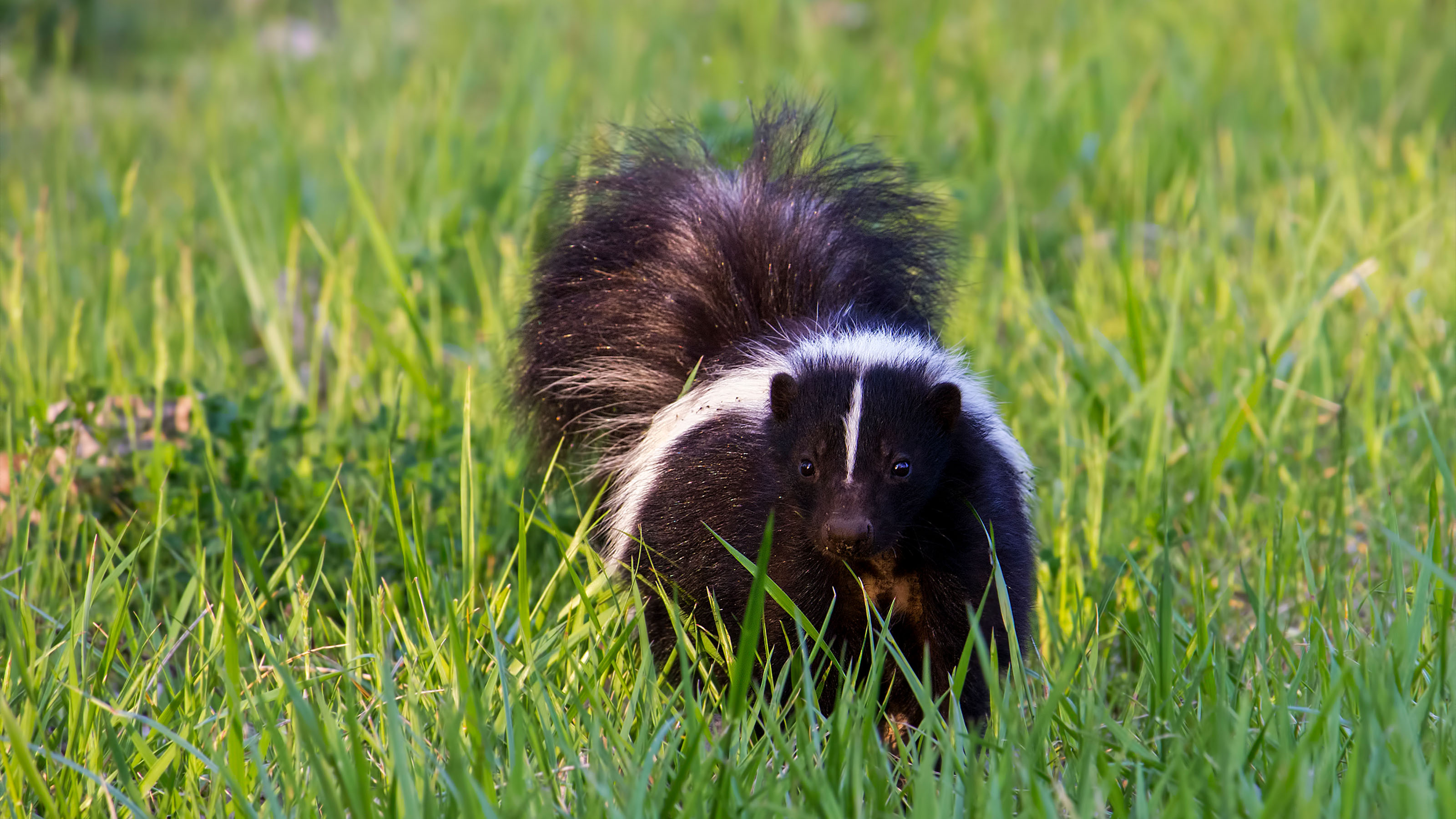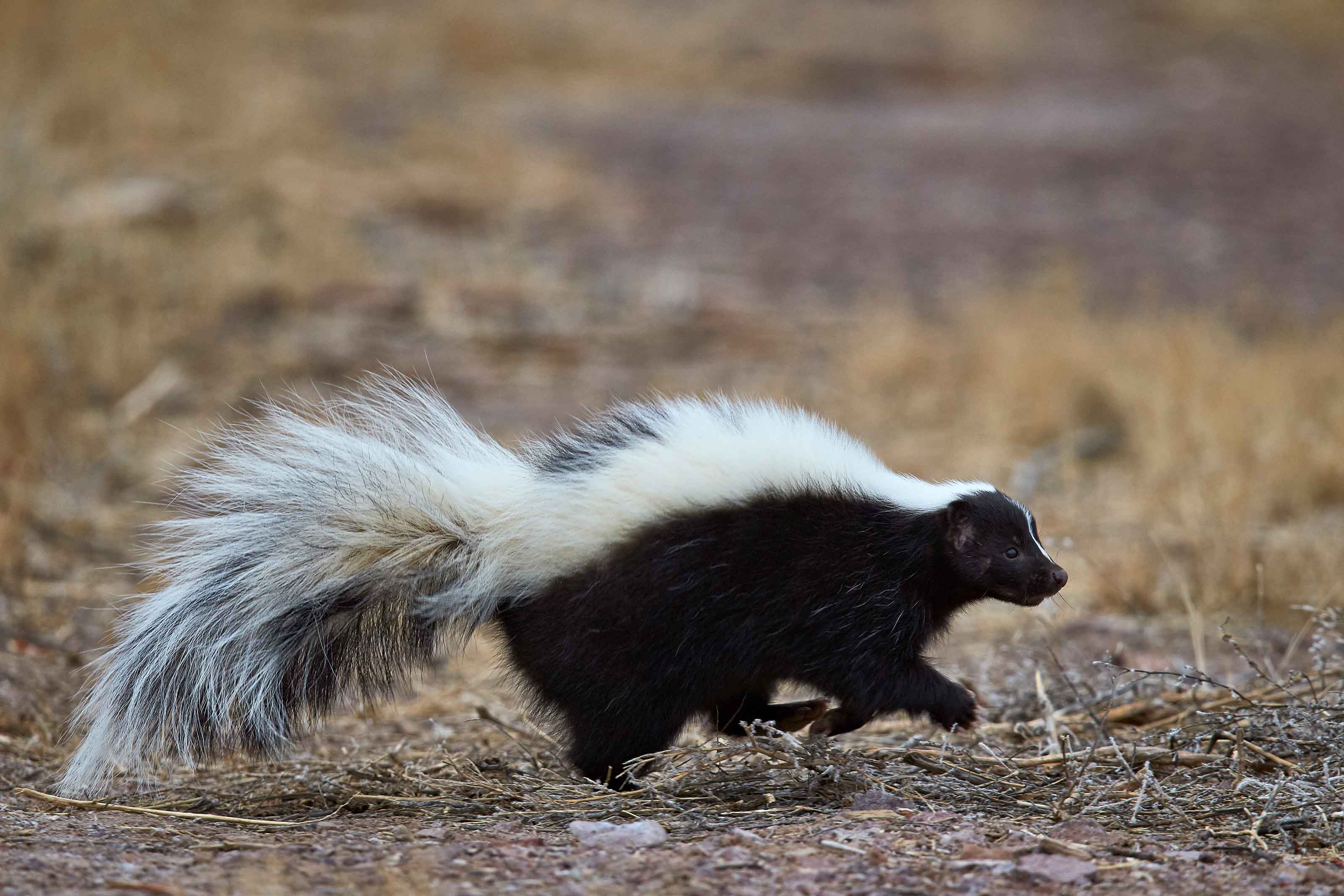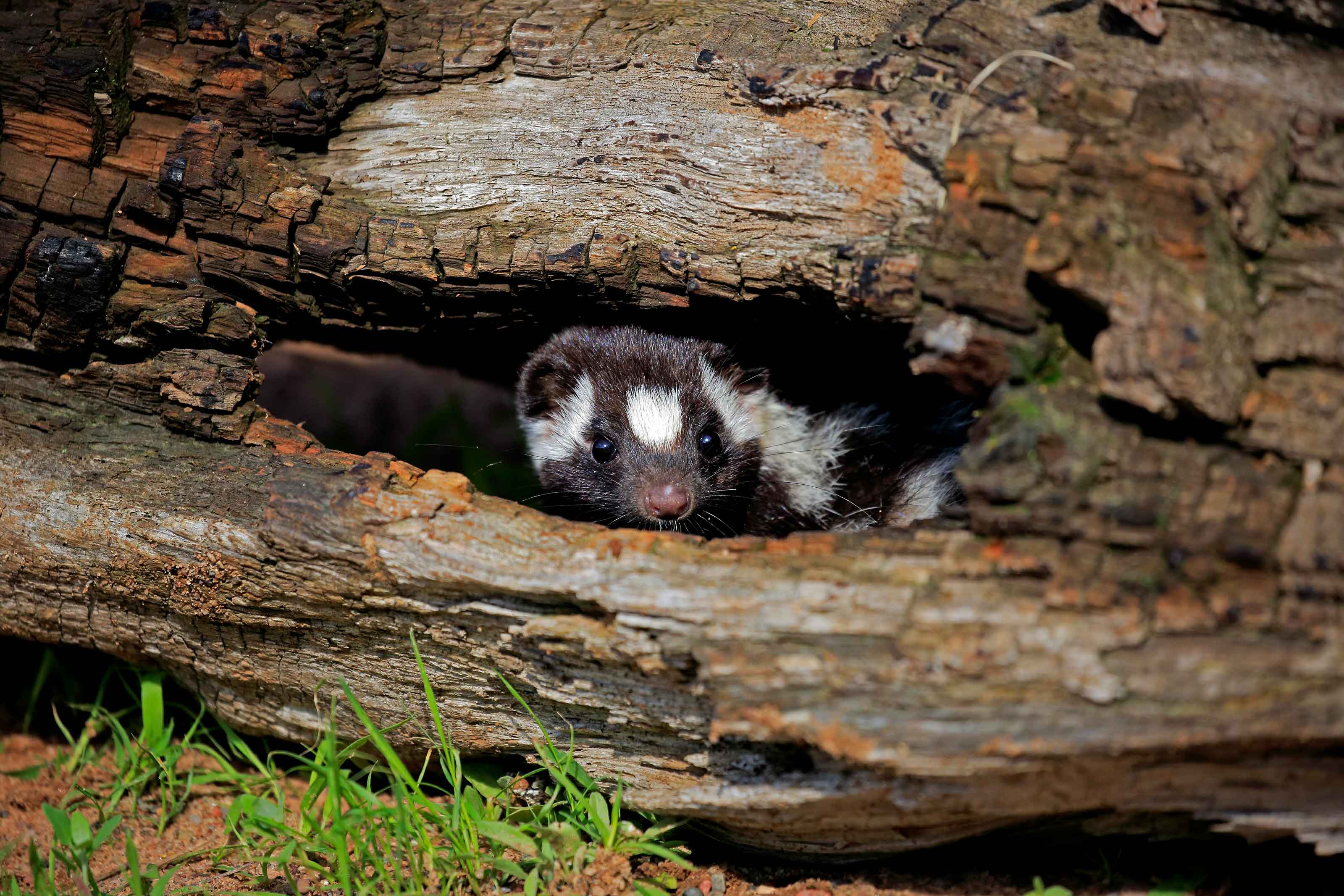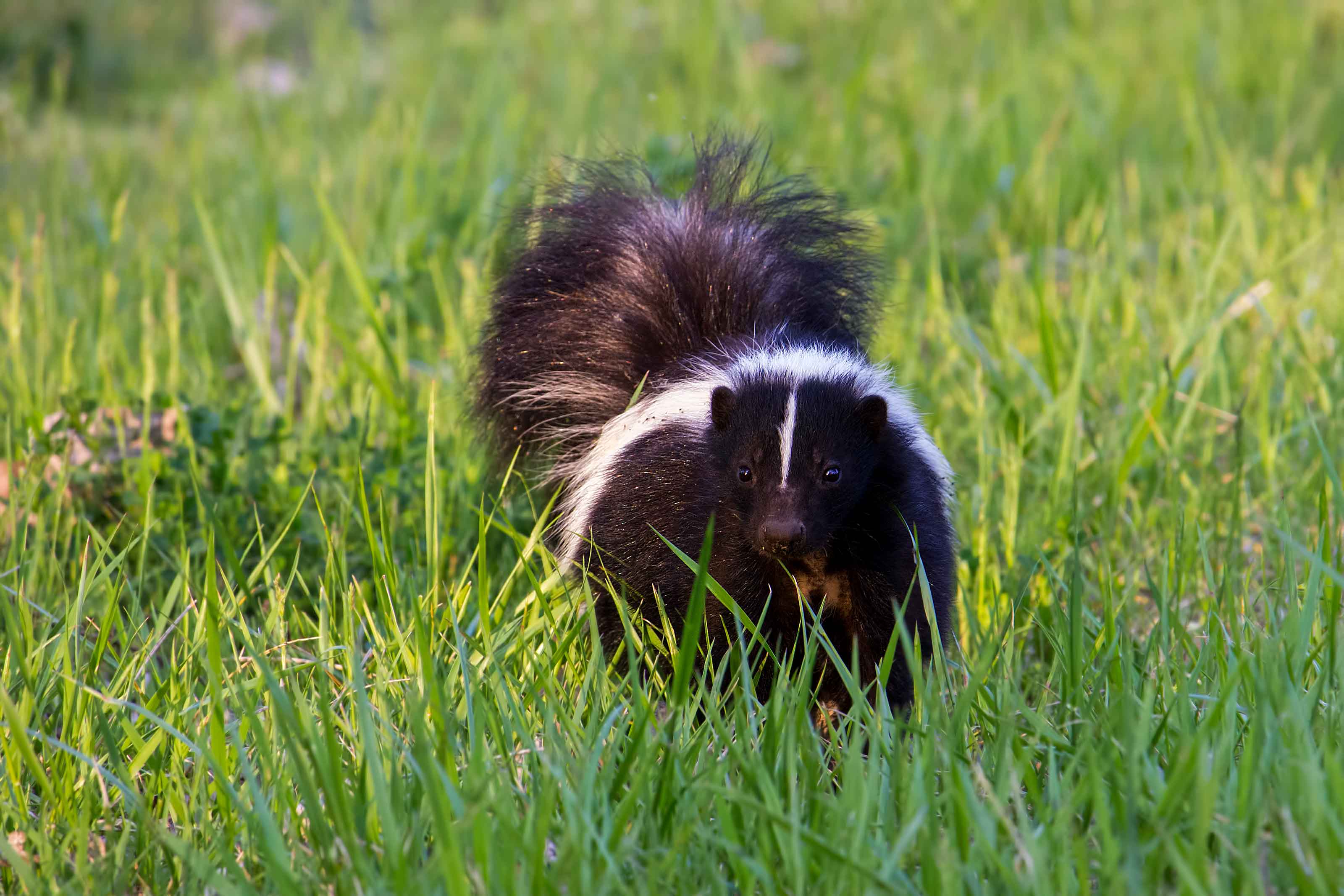How to get rid of skunks in your yard: non-lethal ways to keep these pesky creatures at bay
We've rounded up all the advice you need on how to get rid of skunks in your yard – including simple home remedies and ways to tackle the smell


Wondering how to get rid of skunks in your yard? It's no secret that these stinky intruders can be a real pain. There's that infamous stench that they'll leave hanging around, and they can also make a real mess as they go through your trash or veg beds on the hunt for food. What's more, they can carry diseases and viruses such as rabies.
True, an occasional visit from a skunk or two isn't the worst thing in the world – they're not aggressive towards humans or pets, and they can help to clear up common garden pests such as rats, snails, and Japanese beetles. But, if you start to suspect a more regular presence of these critters then you'll probably want to take action to ward them off.
Just like we shared the lowdown on how to get rid of squirrels, we're here to explain how to get rid of skunks, too.
How to get rid of skunks in your yard: a practical guide
There are many approaches you can try to send these creatures packing – and none of them require reaching for nasty pesticides or setting up intimidating traps yourself.

Striped skunks are the most commonly spotted
How do you know if you have skunks in your backyard?
Before you learn how to get rid of skunks in your yard, you'll want to ensure that it's definitely skunks that you're dealing with. These are the things to look out for:
- The most obvious telltale sign is the smell of a skunk's spray. They use this as a defence mechanism, so if a person, a pet, or another possible predator startles one, then they're likely to get hit with the rotten-egg-like fumes.
- Skunks are nocturnal, so you are unlikely to spot one during the day. However, you may be able to see them roaming around your plot once night falls. They typically have black fur with white stripes running down their backs, and are around the size of a domestic cat. Spotted skunks are less common and are smaller with – you guessed it – irregular-shaped white spots on their fur, as well as broken stripes.
- You may also spot skunk tracks in your backyard ideas – these are similar to racoons' as both animals have five toes.
- Many pests can cause damage to a property – carpenter bees, for instance, bore holes through timber structures (our guide on how to get rid of carpenter bees will come in handy if you're facing this problem). Skunks aren't quite so extreme, but do keep a look out for signs such as holes in your lawn ideas and garbage strewn from your trash cans.
1. Seal your bins properly
A hungry skunk is on the prowl for food, and easy-access bins can seem like a banquet. So, ensure that yours are sealed shut with tight-fitting lids to remove the temptation. You could also consider nifty garden storage ideas to keep them out of sight (this will elevate the look of your plot, too).
Also, think about other potential food sources. Avoid leaving pet food out, for instance, and aim to clean up any leftover food and dirty plates from your outdoor dining ideas, rather than leaving them overnight.

Keep your trash cans sealed
2. Try skunk-repellent granules
Skunks often burrow into beds and lawns on the hunt for grubs, and commercially-bought skunk repellent granules can be a good way to prevent this. Look for ones made from biodegradable, natural ingredients that will not harm children, pets, or plants.
Always follow the instructions on your chosen product's label, but generally you'll need to sprinkle the granules around the perimeter of your plot or affected area, before gently watering them in. They work due to their strong scent and taste (often using garlic, black pepper, or cloves – ingredients that skunks hate) which triggers a natural response in the animal to leave. Remember to reapply to the area every 30 days or so – again check the label for advice.
3. Deter skunks with citrus peels
The team at Wordbirds.org recommend using citrus fruits when learning how to get rid of skunks in your yard. Although the fragrance of lemons and oranges is appealing to us humans, to skunks (and many other pests), it's positively revolting.
They suggest to spread the peels of these around your backyard – replace them once they dry up – to ward off intruders. If you're a fan of Mediterranean garden ideas, why not go one step further and pot up a lemon tree or two? It probably won't be enough to rid your yard of skunks completely, but when combined with other deterring methods, it may well help.

Lemons will help to deter skunks
4. Mix up a concoction from your cupboard
Mixing up your own pest-repelling concoctions is a good option if you're on the hunt for cheap garden ideas, as you're likely to already have the ingredients in your cupboard.
One approach is to mix together castor oil, dish-washing detergent and water and use it as a spray, suggests the team at Old Farmer’s Almanac. Apparently, the smell can offend skunks and ward them off.
For an alternative homemade spray concoction, boil up a mixture of hot peppers, onions, jalapeño, cayenne pepper and water for a few minutes before straining, as suggests PredatorGuard.com.
As with all homemade solutions, test the spray in an inconspicuous area first to ensure it doesn't cause any adverse effects to your plants, patio ideas, or other garden features.
You can try a different homemade remedy when learning how to get rid of ants – our feature has all the tips you need.

Boil up chillies to make a homemade repellent
5. Install outdoor lighting
As we've mentioned, skunks are nocturnal. And, their small eyes are not accustomed to bright lights. So, if you need to know how to get rid of skunks, consider adding outdoor lighting ideas to your plot.
Keep them on throughout the night to make your yard less appealing to these critters – solar lights are a good option to avoid a spike in the electricity bill. Or, consider a bright motion sensor – it's likely to startle the animals and send them on their way should they enter your garden.

Skunks hate bright lights, so if you want to know how to get rid of them in your yard, consider installing some to your home's exterior
6. Clean up your plot
Piles of logs, overgrown hedges, and generally letting nature take its course are all good and well for thriving wildlife garden ideas. However, if you've got a skunk problem on your hands, then it's worth considering a different approach.
These features can all act as shelters for skunks, so to try and deter them, it's best to tidy your plot up. If you trim back overhanging branches of shrubs and move your logs or piles of building materials safely into a shed, then your yard will be less attractive to these intruders.

An old log can become a home for a skunk
7. Try ammonia
Ammonia is another strongly-scented substance that can deter skunks (and other pests such as mice) from your backyard. Soak rags and place them around the area, remembering to replace them often.
However, it's best to avoid this approach if you've got kids or pets, as ammonia is toxic when ingested. Our guide to the most poisonous plants for dogs has more advice for keeping your outdoor space safe.
8. Call in a pro
If your skunk problem has gotten out of hand, then it may be time to call in a wildlife removal professional. They will be able to humanely trap the skunk and remove it safely, properly and lawfully – a job that can be rather intimidating to do yourself.

Other approaches not working? It might be time to call in an expert
How do you get rid of skunks under a shed, deck, or porch?
Sometimes, skunks can make their home beneath your shed, decking ideas, or front porch ideas – which obviously, is not ideal.
The methods above can help to prevent this, as will sealing off the space using sturdy chicken wire. When you do this, dig a trench and extend the bottom length of the wire outwards at an angle before refilling, to deter the animals from digging underneath it. This is a useful technique when learning how to keep rabbits out of your garden, too.
If a skunk or two has already moved in, you have a few options. Firstly, you could simply wait it out. It's likely that your resident skunk will be mothering her babies, and it doesn't take too much time for these babies to grow big enough to be independent – usually by the end of summer. As Toronto Wildlife Centre explains, skunks don't usually stay in their dens for long.
However, if you don't fancy hosting a family of skunks over summer, then you can try to humanely harass them out – as continues the team at Toronto Wildife Centre. Use the repelling methods described above, as close to the den entrance as possible, and the mother skunk will likely leave your plot for more comfortable pastures – taking her babies with her.
To check they have left, stuff the entrance with newspaper – if it's still there in a few days time, it's likely they have moved on. Once you're sure they have left, seal up the space to prevent a new family from moving in.

A resident skunk can spoil the ambience of your porch
How do you get rid of skunk smell?
Skunk smell comes from an oily, yellow substance which can reach up to over three feet when released. If you or your pets get sprayed, you'll want to act fast – Healthline has some good advice:
What to do if you get sprayed by a skunk:
- As soon as you've been sprayed, take a shower or bath using a deodorant soap or grease-cutting dish detergent.
- Use a shampoo made for oily hair.
- You can also take a baking-soda bath for 15 to 20 minutes – simply add two to four cups of baking soda into water. Rinse away any residue from your skin afterwards.
What to do if your pet gets sprayed by a skunk:
- Mix together one teaspoon of baby shampoo or grease-cutting dish detergent, 1/4 cup of baking soda, and one quart of 3% hydrogen peroxide.
- Lather the mixture into your pet's fur, avoiding their eyes, and let it sit for five minutes (no longer, as it may start to lighten the color).
- Rinse it off with a regular pet shampoo.
- Don't store any leftover mixture as it may explode over time.
- You can also use a store-bought product – follow the instructions on the label.

Your pets will need a good wash after being sprayed by a skunk

The garden was always a big part of Holly's life growing up, as was the surrounding New Forest where she lived. Her appreciation for the great outdoors has only grown since then. She's been an allotment keeper, a professional gardener, and a botanical illustrator – plants are her passion.
